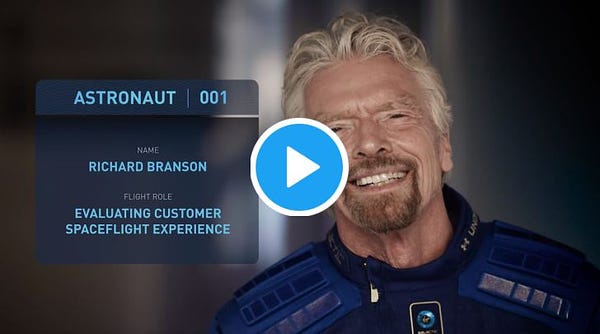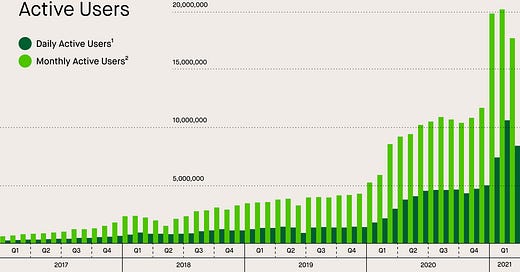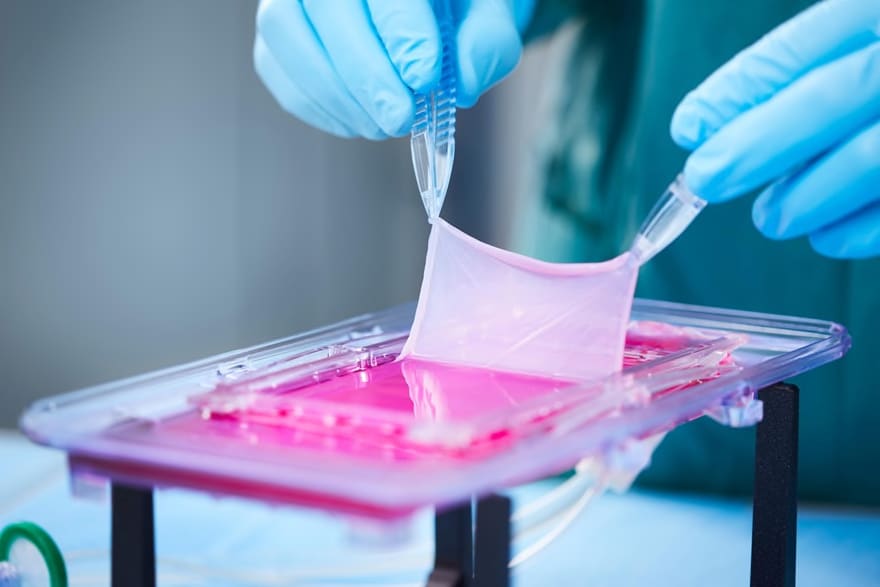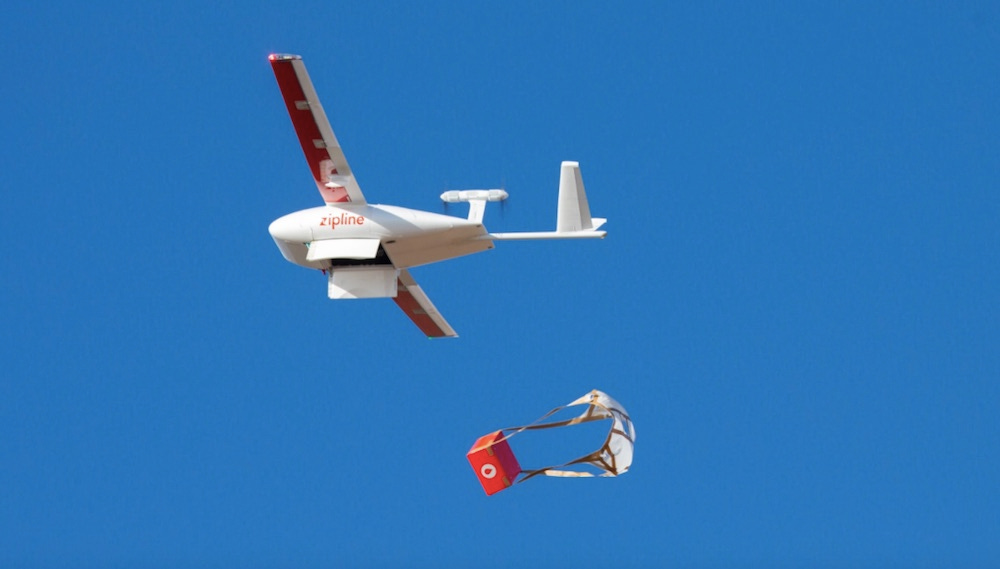💻 Optical deep-learning, 🔋 a potential grid-scale battery tipping point, and 📚 Chinese cybersecurity regulations
Thomas's Innovation Wrap #72
Greetings,
Here's your weekly wrap of the latest technology, innovation, and finance news.
💲 Finance
Robinhood has filed for IPO (see the S-1). The company ended March 2021 with 17.7 million monthly active users, up 106% from the year before.
Unlike many recent IPOs, Robinhood was profitable last year, generating a net income of $7.45 million on net revenue of $959 million in 2020, versus a loss of $107 million on $278 million in 2019, according to Robinhood’s S-1 filing with the Securities and Exchange Commission.
However, the brokerage lost $1.4 billion in the first quarter of 2021 tied to emergency fundraising-related losses during January’s GameStop trading mania. The company generated $522 million in revenue in the first quarter if 2021, up 309% from the $128 million earned in the first quarter of 2020. Options trading accounts for about 38% of revenue while equities and crypto are 25% and 17% of revenues, respectively.
💻 Chips and Computing
Ryan Hamerly wrote a fascinating piece arguing that the future of deep learning is photonic. The basic idea is that the hard computational linear algebra at the heart of deep learning could be done more efficiently using photons instead of electrons. Ryan and his MIT colleagues published a paper about how this could be done in 2019, and they’re now working on building an optical matrix multiplier that would do this.
Based on the technology that’s currently available for the various components (optical modulators, detectors, amplifiers, analog-to-digital converters), it’s reasonable to think that the energy efficiency of neural-network calculations could be made 1,000 times better than today’s electronic processors. Making more aggressive assumptions about emerging optical technology, that factor might be as large as a million. And because electronic processors are power-limited, these improvements in energy efficiency will likely translate into corresponding improvements in speed.
📚 Regulation
Chinese ride-sharing giant Didi Chuxing has had its app removed from Chinese app stores over the weekend after the Cyberspace Administration of China (CAC) launched an investigation into the company’s cybersecurity risks. The new investigation comes just days after the company’s blockbuster US IPO and has prompted fresh criticism of Chinese regulators. The Chinese regulators claim they suggested Didi delay their IPO ahead of the probe, but the company went ahead with it anyway. As of Friday, Didi was valued at US$75 billion.
Beijing has recently been working to stamp out personal privacy breaches in the world’s largest internet market, with nearly 1 billion users. The scrutiny of data privacy is part of a wider crackdown on China’s biggest tech companies, with tightened control over their business practices, including a record 18.2 billion yuan (US$2.8 billion) fine imposed on e-commerce giant Alibaba in early April for monopolistic business practices.
🔬 Biology
A Swiss startup is growing personalised skin for burn victims.
“It’s not artificial skin, but it’s not exactly natural skin either,” said Daniela Marino, cofounder and director of CUTISS, launched in 2017 at the University Children’s Hospital Zurich. “To be precise, it’s a skin-tissue equivalent produced by bio-engineering.”
💊 Health
A clinical trial from University College London (UCL) successfully tested a new CRISPR-based therapy that treats hereditary transthyretin amyloidosis, which patients receive through a single infusion into their bloodstream — a much easier delivery mechanism than past CRISPR-based therapies. Intellia, which co-developed the treatment alongside Regeneron, has seen its stock price rise 127% over the past month.
“This is a major milestone for patients,” Doudna said. “While these are early data, they show us that we can overcome one of the biggest challenges with applying CRISPR clinically so far, which is being able to deliver it systemically and get it to the right place.”
🐭 Mouse Health
Researchers have tested a brain implant in mice that both detects pain and destroys it.
“Our findings show that this implant offers an effective strategy for pain therapy, even in cases where symptoms are traditionally difficult to pinpoint or manage,” said Drs. Jing Wang and Valentino D.B. Mazzia, who led the study.
Researchers at Tohoku University in Japan have identified a new treatment candidate that reverses the effect of dementia in mice (see the paper).
Accordingly, SAK3 significantly recovered mesencephalic dopamine neurons from cell death.
🔒 Cybersecurity
Hundreds of businesses, including one of Sweden’s largest grocery chains, have been hit by a ransomware attack that reached its victims through a fake software update after Kaseya, a software provider, was hacked. Russian cybercriminal group REvil is believed to be behind the attack, and they’re demanding $70 million to unlock affected machines.
“What makes this attack stand out is the trickle-down effect, from the managed service provider to the small business,” Mr. Hammond said. “Kaseya handles large enterprise all the way to small businesses globally, so ultimately, it has the potential to spread to any size or scale business.”
Some of the affected companies were being asked for $5 million in ransom, Mr. Hammond said. Thousands of companies were at risk, he said.
🔋 Batteries
Australia will get its first grid-scale battery built without government support by the end of 2022, at an estimated cost of $270 million to $300 million. This is an important tipping point because it suggests that grid-scale batteries may now be profitable on a stand-alone basis, which would spur further investment.
Rather, the main market opportunity for batteries will be to take advantage of tapping low-cost electricity and then releasing it during higher-cost periods.
The introduction of five-minute settlement periods within the National Electricity Market in October to replace the current 30-minute period also means “there will be plenty of arbitrage to go around” for suppliers such as battery owners, Professor Mountain said.
Nissan plans to build an EV battery `gigafactory’ in the UK.
Envision AESC, a Chinese-owned company that already provides Nissan with batteries at the assembly plant in Sunderland, will invest 450 million pounds, or $620 million, in a new so-called gigafactory to supply electric cars made at the site. It is part of a partnership between the two companies that began when Nissan sold AESC to Envision in 2019.
CNBC profiled lithium-metal batteries in this 12-minute video, focusing on Cuberg, a startup that Northvolt acquired in March.
🌞 Renewables
A recent paper in Joule argues that increasing US renewable generation to 90% by 2050 would yield lower system costs than maintaining the current generation mix. They point out that incremental costs of the system rise steeply as the renewables mix approaches 100%.
🛰️ Space
Richard Branson will fly to suborbital space on July 11 on a Virgin Galactic flight, 9 days ahead of Jeff Bezos’ July 20 suborbital flight with Blue Origin. Neither company has announced when flights will be open to the wider public, but a suborbital space flight ticket is expected to cost $200,000 to $350,000.


🔗 Blockchain and Crypto
Tim Berners-Lee, the inventor of the World Wide Web, has sold an NFT of the original source code for $5.4 million through an auction at Sotheby’s.
Or, sort of. Berners-Lee isn’t selling the actual code, but the equivalent of an autographed copy. The rise of NFTs gave Berners-Lee an opportunity to fundraise off his legacy without attempting to claw back intellectual property rights, which at this point would have been impossible anyway. Thanks to NFTs, Berners-Lee can keep his code in the public domain and simultaneously entice someone to buy a certificate of ownership. Is this commodification directly opposed to the ethos of the open source movement? Well, yeah. But also: If the code itself is still public domain, does it matter, especially when there’s so much money sloshing around?
Bitcoin mining has become easier and more profitable since China cracked down on domestic mining.
Assuming fixed power costs, Zhang estimates revenues of $29 per day for those using the latest-generation Bitmain miner, versus $22 per day prior to the change. Longer-term, although miner income can fluctuate with the price of the coin, Zhang also noted that mining revenues have dropped only 17% from the bitcoin price peak in April, whereas the coin’s price has dropped about 50%.
🤩 Advertising
Advertisers have shifted spend towards Android after Apple tightened its tracking rules.
Tinuiti’s Facebook clients went from year-over-year spend growth of 46% for Android users in May to 64% in June. The clients’ iOS spending saw a corresponding slowdown, from 42% growth in May to 25% in June. Android ad prices are now about 30% higher than ad prices for iOS users, Mr. Taylor said. Tinuiti clients’ overall spending on Facebook increased—Android users gained a greater share of it, Mr. Taylor said.
🤖 Robotics and Drones
Zebra Technologies acquired Fetch Robotics, a warehouse automation startup, for $290 million.
The companies said the acquisition would help them integrate technology to connect human workers, tools like hand-held scanners and self-navigating robots, and the software that directs the flow of distribution, manufacturing and retail operations.
Zipline raised $250 million to scale its drone delivery services. The round was priced at $2.75 billion.
Zipline is perhaps best known for its operations in Ghana. Zipline Ghana is a central part of the Ghanian medical supply chain, operating four distribution centers serving 2,000 health facilities with routine medical supplies and emergency blood and essential medicines. Zipline Ghana can service 24 million people, or 90% of the country’s population.
🛍️ Ecommerce
The average price worldwide to ship a 40-foot container has more than quadrupled from a year ago.
Shipping experts say the rising ocean rates are the result of disruptions across supply chains that triggered delays at ports and inland distribution networks as Western retailers and manufacturers rush to restock inventories that were depleted during the Covid-19 pandemic.
The rates started edging upward last summer as consumer demand began rising with the end of lockdowns.
⚡ Other Snippets
The Station of Extreme Light (SEL) in China has achieved a technological breakthrough that will allow them to fire a 100-petawatt laser shot in about two years. A single pulse would be 10,000 times more powerful than all electricity grids in the world combined and has the potential to tear apart space-time.
The extremely powerful laser beam, when focused on an extremely small spot in a vacuum, can make a subatomic particle pop out of the blue, according to the prediction of physical theory. The SEL was designed to make this happen.
Researchers from Loughborough University and the University of Manchester have written a free algorithm that increases the accuracy of 3D body scans by 4500%.
They found that the average margin of error for current 3D scanning machines is around 13.8cm when data is captured non-consecutively.
However, once the Gryphon code had been used alongside capturing data consecutively, the figure fell to 0.3cm… a 4500% improvement in precision.
Andrej Karpathy, Director of AI at Tesla, explained why they think self-driving cars don’t need lidar during his talk at this year’s Conference on Computer Vision and Pattern Recognition (CVPR).
Have a great week,
Thomas
About Thomas Rice
Thomas Rice is a portfolio manager of a global equities fund based in Sydney, Australia. You can find him on Twitter at @thomasrice_au.






